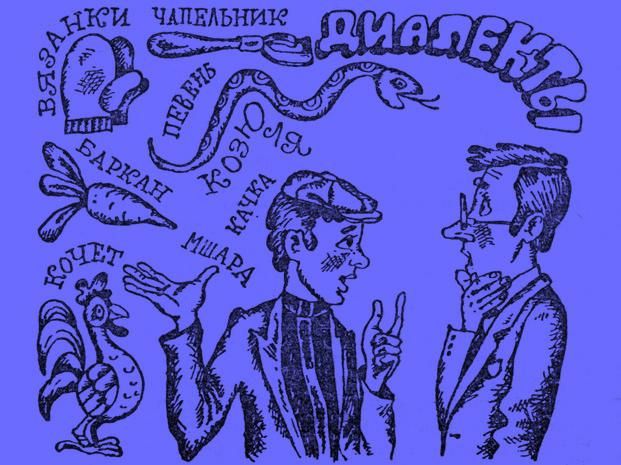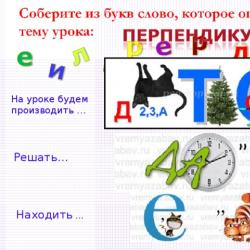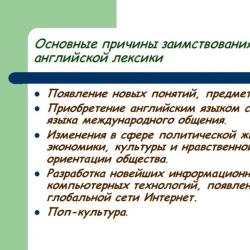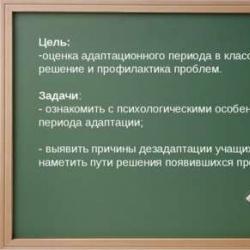Dialectisms in the family. What is dialectism
Have there been incidents with you when, while reading the works of Russian classics, you did not understand what they were writing about? Most likely, this was not due to your inattention to the plot of the work, but because of the writer's style, which includes obsolete words, dialectisms.
V. Rasputin, V. Astafiev, M. Sholokhov, N. Nekrasov, L. Tolstoy, A. Chekhov, V. Shukshin, S. Yesenin liked to express themselves with words of this type. And this is only a small part of them.
Dialectisms: what is it and how many types exist
Dialects are words whose area of distribution and use is limited to some territory. They are widely used in the vocabulary of the rural population.
Examples of dialectisms in Russian show that they are characterized by individual characteristics concerning phonetics, morphology, vocabulary:
1. Phonetic dialectisms.
2. Morphological dialectisms.
3. Lexical:
- actually lexical;
- lexico-semantic;
4. Ethnographic dialectisms.
5. Word-building dialectisms.
Dialectisms are also found at the syntactic, phraseological levels.
Types of dialectisms as separate features of the original Russian people
In order to find out distinctive features dialect of the Russian people, it is necessary to consider dialectisms in more detail.

Examples of dialectisms:
- The replacement of one or more letters in a word is typical for phonetic dialectisms: pshhono - millet - Khvedor - Fedor.
- Word changes that are not the norm in terms of matching words in sentences are typical for morphological dialectisms: I spoke with smart people (substitution of cases, plural and singular).
- Words and expressions that are found only in a certain locality, which do not have phonetic and derivational analogues. Words whose meaning can only be understood from the context are called lexical dialectisms. In general, in the well-known dictionary use, they have equivalent words that are understandable and known to everyone. The following dialectisms (examples) are typical for the southern regions of Russia: beetroot - beetroot - beetroot - onion.
- Words that are used only in a particular region, which have no analogues in the language due to their correlation with the characteristics of the life of the population, are called "ethnographic dialectisms". Examples: shanga, shanga, shaneshka, shanechka - a dialectism denoting a certain type of cheesecake with a top potato layer. These delicacies are widespread only in a certain region; they cannot be characterized in one word from general use.
- Dialectisms that have arisen due to a special affixal design are called derivational: guska - goose, pokeda - yet.
Lexical dialectisms as a separate group
Due to their heterogeneity, lexical dialectisms are divided into the following types:
- Actually lexical: dialectisms that have a common meaning with general literary ones, but differ from them in spelling. They can be called peculiar synonyms for commonly understood and well-known words: beets - sweet potato - stitch - track.
- Lexico-semantic. Almost the exact opposite of lexical dialectisms: have the same spelling and pronunciation, but differ in meaning. Correlating them, it is possible to characterize as homonyms in relation to each other.
For example, the word "peppy" in different parts of the country can have two meanings.
- Literary: energetic, full of energy.
- Dialect meaning (Ryazan): smart, neat.
Thinking about the purpose of dialectisms in the Russian language, we can assume that, despite the differences with general literary words, they replenish the stocks of the Russian literary vocabulary along with them.
The role of dialectisms
The role of dialectisms for the Russian language is diverse, but first of all they are important for the inhabitants of the country.

Functions of dialectisms:
- Dialectisms are one of essential funds oral communication for people living in the same territory. It was from oral sources that they penetrated into written ones, giving rise to the following function.
- The dialectisms used at the level of district and regional newspapers contribute to a more accessible presentation of the information provided.
- Fiction takes information about dialectisms from colloquial speech residents of specific regions and from the press. They are used to convey local features of speech, and also contribute to a more vivid transmission of the character of the characters.
Some expressions slowly but surely fall into the general literary fund. They become known and understood by everyone.
The study of the functions of dialectisms by researchers

P.G. Pustovoit, exploring the work of Turgenev, focused on dialectisms, examples of words and their meaning, he names the following functions:
- characterological;
- cognitive;
- speech dynamization;
- cumulation.
V.V. Vinogradov based on the works of N.V. Gogol identifies the following series of functions:
- characterological (reflective) - it contributes to coloring the speech of characters;
- nominative (naming) - manifests itself when using ethnographisms and lexical dialectisms.
The most complete classification of functions was developed by Professor L.G. Samotik. Lyudmila Grigoryevna singled out 7 functions for which dialectisms are responsible in a work of art:
Modeling;
nominative;
emotive;
Culminative;
Aesthetic;
phatic;
Characterological.
Literature and dialectisms: what threatens the abuse?
Over time, the popularity of dialectisms, even at the oral level, decreases. Therefore, writers and correspondents should use them sparingly in their work. Otherwise, the perception of the meaning of the work will be difficult.
![]()
Dialectisms. Examples of inappropriate use
When working on a work, you need to think over the relevance of each word. First of all, you should think about the appropriateness of using dialect vocabulary.

For example, instead of the dialect-regional word "kosteril" it is better to use the general literary "scold". Instead of "promised" - "promised".
The main thing is to always understand the line between moderate and appropriate use. dialect words.
Dialecticisms should help the perception of the work, and not hinder it. To understand how to use this figure of the Russian language correctly, you can ask for help from the masters of the word: A.S. Pushkin, N.A. Nekrasov, V.G. Rasputin, N.S. Leskov. They skillfully, and most importantly, moderately used dialectisms.
The use of dialectisms in fiction: I.S. Turgenev and V.G. Rasputin
Some works of I.S. Turgenev is difficult to read. Studying them, you need to think not only about the general meaning of the literary heritage of the writer's work, but also about almost every word.
For example, in the story "Bezhin Meadow" we can find the following sentence:
“With quick steps I walked a long “area” of bushes, climbed a hill and, instead of this familiar plain ... I saw completely different places unknown to me”
An attentive reader has a logical question: “Why did Ivan Sergeevich put in brackets the seemingly ordinary and appropriate word “area”?”.
The writer personally answers it in another work “Khor and Kalinich”: “In the Oryol province, large continuous masses of bushes are called “squares”.
It becomes clear that this word is widespread only in Oryol region. Therefore, it can be safely attributed to the group of "dialectisms".
Examples of sentences using terms of a narrow stylistic orientation used in the speech of residents of certain regions of Russia can be seen in the stories of V.G. Rasputin. They help him show the identity of the character. In addition, the personality of the hero, his character is reproduced precisely through such expressions.

Examples of dialectisms from the works of Rasputin:
- Cool down - cool down.
- To roar - to rage.
- Pokul - for now.
- Engage - get in touch.
It is noteworthy that the meaning of many dialectisms cannot be understood without context.
Attention, only TODAY!
Russian folk dialects, or dialects(gr.
Hosted on ref.rf
dialectos - adverb, dialect), have in their composition a significant number of original folk words, known only in a certain area. So, in the south of Russia, the stag is called grip, clay pot - mahotka, bench - condition etc. Dialectisms exist mainly in the oral speech of the peasant population; in an official setting, speakers of dialects usually switch to a common language, the conductors of which are school, radio, television, and literature.
The dialects imprinted the original language of the Russian people, in individual features local dialects, relic forms of Old Russian speech have been preserved, which are the most important source for the restoration of historical processes that once affected our language.
Dialects are different from the vernacular national language various features - phonetic, morphological, special word usage and completely original words unknown to the literary language. This gives grounds to group the dialectisms of the Russian language according to their common features.
1. Lexical dialectisms - words known only to speakers of the dialect and outside of it, having neither phonetic nor derivational variants. For example, in South Russian dialects there are words beetroot (beetroot), tsibulya (onion), gutorit (speak), in the northern sash (belt), peplum (beautiful), golitsy (mittens). In the common language, these dialectisms have equivalents that name identical objects, concepts. The presence of such synonyms distinguishes lexical dialectisms from other types of dialect words.
2. Ethnographic dialectisms - words naming objects known only in a certain area: shanezhki - "pies prepared in a special way", shingles - "special potato pancakes", nardek - "watermelon molasses", l / anarka - "kind of outerwear", poneva - "a kind of skirt", etc. Ethnographisms do not have and cannot have synonyms in the national language, since the objects themselves, designated by these words, have a local distribution. As a rule, these are household items, clothes, food, plants, etc.
3. Lexico-semantic dialectisms - words that have an unusual meaning in the dialect: bridge- "floor in the hut", lips - "mushrooms of all varieties, except white", shout (someone)- "call for", myself- "master, husband", etc. Such dialectisms act as homonyms for common words used with their inherent meaning in the language.
4. Phonetic dialectisms - words that have received a special phonetic design in the dialect cai(tea), chain(chain) - consequences of ʼʼclatterʼʼ and ʼʼchokanyaʼʼ, characteristic of northern dialects; hverma(farm), paper(paper), passport(the passport), life(life).
5. Word-building dialectisms - words that have received a special affix in the dialect: stump(rooster), goose(goose), upskirt(calf), strawberry(strawberry), bro(brother), Shuryak(brother-in-law), darma(for nothing) always(alwaysalways) from where(where), pokeda(bye), Evonian(his), theirs(them), etc.
6. Morphological dialectisms - forms of inflection not characteristic of the literary language: soft endings for verbs in the 3rd person ( go, go), the ending - am nouns in the instrumental plural ( under the pillars), the ending e for personal pronouns in the genitive singular: me, you and etc.
Dialect features are also characteristic of the syntactic and phraseological levels, but they do not constitute the subject of study of the lexical system of the language.
DIALECTISM is a word or a stable combination in a literary language that is not included in its lexical system, but belongs to one or more dialects of the Russian national language. Depending on what features of the dialect are reflected in the dialect word, dialectisms are divided into lexical-phonetic (pavuk, cf. spider, eastern, cf. sharp), lexical-derivative (saucers, cf. saucer, song, cf. rooster), actually lexical (shaber - "neighbor", Basque - "beautiful"), lexical-semantic (guess - "learn", freckle - "fever"). A special group is made up of ethnographic dialectisms - words that name concepts that are characteristic only for the life of native speakers. This is the name of clothes, utensils, dishes, local customs, etc. (shushun, paneva - the name of women's clothing; rybnik - "pie with baked whole fish"; dozhinki - the name of the holiday associated with the end of field work). Ethnographic dialectisms usually do not have synonyms in the literary language.
Often the vocabulary of dialects is characterized by accuracy in the designation of concepts. Therefore, dialectisms are used by writers in the language works of art for various purposes: to convey local color, to create or enhance a comic effect, to accurately depict realities, to express the language of characters, and others. There are certain patterns in the introduction of dialectisms into the language of a work: they are usually introduced into the speech of characters, and ethnographic and proper lexical dialectisms are most often used. In Russian classical literature, D. Grigoryevich, A. Pisemsky, I. Turgenev, L. Tolstoy and others introduced dialectisms into the language of their works, in contemporary literature they are used by M. Sholokhov, V. Tendryakov, V. Belov, V. Soloukhin and others.
Dialectisms. 1. Words from different dialects are often used in the language of fiction for a stylistic purpose (to create local color, to characterize characters in speech).
2. Phonetic, morphological, syntactic, phraseological, semantic features inherent in individual dialects in comparison with literary language.
Dialectisms are grammatical. Grammatical features in a particular dialect, manifested in declension, the formation of forms of parts of speech, the transition from one grammatical gender to another, etc. ), weaker (instead of weaker). The whole face became so kind of blue (Bunin). The cat smells whose meat it has eaten (Sholokhov).
Dialectisms are lexico-phonetic. Words with a different vowel than in the literary language. Eastern (sharp), spider (spider), pinzhak (jacket), hear (listen).
Semantic dialectisms. Common words with a meaning other than in the literary language. Much in the meaning of “very”, arrogant in the meaning of “sudden”, flood in the meaning of “drown”, guess in the meaning of “recognize by sight”.
Dialectisms are word-forming. Words with a different word-formation structure than those of the same root literary synonyms. Run (run), saucer (saucer), guska (goose), dozhzhok (rain), not walking and not going side (not going, not going), side (side).
Dialectisms are actually lexical. Local names of objects and phenomena that have other names in the literary language. Baz (covered yard for livestock), beetroot (beets), veksha (squirrel), gashnik (belt), infection (now), kochet (rooster), stubble (stubble).
Phonetic dialectisms. Features of the sound system of speech. Girl, scream, cai (see clatter), nyas, myashok (see yak), etc.
Phraseological dialectisms. Stable combinations found only in dialects. To give as a waste (to expose to a blow), to carry both from the Don and from the sea (to carry nonsense), to lag behind (knock down), wheezing to bend (to work with tension).
Ethnographic dialectisms. Local names for local items. Obednik, poberezhnik, polunoshnik, shalonik (the name of the winds among the coast-dwellers), crane (a lever for lifting water from a well), cats (birch bark sandals), novina (a harsh canvas).
Dialectisms (from the Greek Dialektos dialect, dialect) are linguistic features characteristic of territorial dialects, included in literary speech. Phonetic dialectisms - clatter: to [c] ka, but [c]; yakane: [in a] draw, [n a] rotten; pronunciation [x] in place of r at the end of the word: dream [x], other [x].
Grammatical and dialectisms: t at the end of the 3rd l. verbs: go, take; ending genus. n. I declension of nouns - e: from the wife, from the sister; special management of pretexts: came from Moscow, left for bread, go to the hut. Word-formative dialectisms: bilberry, cherniga (bilberry), heifer, telysh, telesh (calf), sideways (on the side).
Lexical dialectisms can be of several types: 1) ethnographers name objects, concepts that are characteristic of everyday life, the economy of a given area, and have no parallels in the literary language: noneva variety of a skirt, a vessel made of birch bark; 2) proper lexical dialectisms - synonyms of the corresponding words of the literary language: kochet (rooster), bascoi (beautiful), hefty (very); 3) semantic dialectisms have a different meaning than in the literary language: canopy bridge, bad weather, bad weather.
Dialectisms are used in the language of fiction for stylization, speech characteristics of characters, and creation of local color. Dialectisms can also be found in the speech of persons who have not fully mastered the norms of the literary language.
DIALECT (from the Greek Dialektos-conversation, speech, dialect) is a kind of language that is characterized by the relative unity of the system (phonetic, grammatical, lexical) and is used as a means of direct communication in a team located in a certain limited area. The dialect is part of a larger language education, is opposed to other parts of this whole, to other dialects, and has with them common features. There are territorial social dialects.
To define a territorial dialect as part of a whole, the concepts of dialect difference and isogloss are essential. Examples of dialect differences can be okanye and akanye, the distinction between sounds (ts) and (h) and their indistinguishability (clatter), the presence of a sound (g) of an explosive formation and a sound (y) of a fricative formation, forms R. P. units. h Line on linguistic map, showing the distribution of dialect differences in the territory, is called isogloss. Isoglosses of different phenomena can approach each other, forming bundles. With the help of bundles of isoglosses, territories are distinguished that are characterized by a relative commonality of the language system, that is, dialects are distinguished. This also takes into account extralinguistic socio-historical facts, such as the territorial prevalence of phenomena, elements of material and spiritual culture, historical and cultural traditions, etc. Thus, the dialect has not only linguistic, but also socio-historical content. This content varies historical periods. In the era of the tribal system, tribal dialects existed. The era of feudalism is associated with the emergence of territorial dialects. It was for feudalism that the formation of new dialects and their specific features was an actual process. Under capitalism, with the overcoming of feudal fragmentation, dialect education is suspended. Under socialism, dialects are a vestigial category: they are no longer brought into being by socio-economic conditions, but continue to exist, while decomposition, deformation, leveling, and approximation to the norms of the literary language take place.
Territorial dialectisms are characterized by social differentiation. The traditional type of dialect is singled out, usually represented by the older generation, ch. arr. women, and the language of youth, which approaches the literary language. Dialects are always opposed to literary language. Interaction between dialect and lit. language currently determines the ways of further and their development.
Under the social dialects are meant professional and various kinds of languages. There is a significant difference between territorial and social dialects: the features of the former relate to the entire structure of the language, therefore they are part of a more general language formation, the features of the latter cover only the facts of vocabulary and phraseology.
Due to the complexity of the dialectal articulation of the language, when describing the dialectal structure of the Russian language, terms of a different volume are used: adverb and dialect. In Russian scientific literature the term "dialect" can be used as a synonym for the terms "adverb" and "dialect".
DIALECTISMS
Dialect vocabulary refers to words that are not included in the national lexical system, but belong to one or more dialects of the Russian national language. Dialect vocabulary is non-literary vocabulary, vocabulary of oral colloquial and everyday speech of any part of the Russian people, united by a territorial community.
Dialecticisms, being used in fiction, are perceived as alien to the literary language and are usually used in stylistic artistic and expressive purposes.
Words of a dialectal character are usually called dialectal, other terms are also used: “provincialism”, “regional words”, etc. It is best to use the most common term - “dialectisms”, but with a clarification - “lexical”. Such a clarification is necessary due to the fact that dialectisms can also be of a different nature, namely phonetic (Arinka, look, L. Tolstoy is sitting on the side of the Cheka) and grammatical (You will warm your back, but the scent is frozen. D. A. - L. Tolstoy).
Many of the lexical dialectisms reflect the distant past of our language and are by origin common words that have been preserved only in separate territorial branches berya (an armful), licorice, doldon (a smooth place for a current; cf.: palm), borosno (rye flour), belly ( belongings), goiter (there is; derivative care), plow (in the meaning of “waving”, cf.: fan), zh uda (horror, fear; derivative is creepy), hacker (miser, cf. the same root skared), fattened ( throat, mouth), etc.
All lexical dialectisms, as already noted, are outside the boundaries of the national literary speech. However, this does not mean that there were no points of contact between the two lexical systems - national and dialectal. Much of what was previously dialectal has expanded the scope of its use, has become known to the entire Russian people, and has become part of the national literary language; much of what is still the property of folk dialects is often used for pictorial purposes in fiction.
The words that came into the literary language from dialects include, for example, clumsy, snuggle, nonsense, eagle owl, plow, frail, tedious, smile, very biryuk, take a nap, hut, clumsy, mumble, hype, background, etc.
The process of enriching the national literary vocabulary at the expense of certain groups of dialect words was especially intense during the period of the formation of the national Russian language, it manifested itself to a much lesser extent later and is manifested at the present time.
In connection with the normativity of the literary language, in connection with the need to preserve its purity and correctness, the question of the extent and in what styles it is legitimate to use dialect words in the system of modern literary vocabulary is of particular importance. It is clear that the strengthening of dialect words in the popular vocabulary is currently possible only in two cases; 1) if the everyday life of the whole people includes an object that was known at the beginning in any one area; 2) if lexical dialectism is a good expressive and expressive synonym for a general literary word.
The use of lexical dialectisms in fiction and journalistic literature is also possible outside these conditions, as stylistic means, characterological facts that make it possible to characterize the hero’s speech, stylize speech, etc. The use of lexical dialectisms outside certain artistic and expressive tasks, as well as in all other styles of literary styles of the literary language is a violation of the norms of modern Russian literary speech.
Naturally, due to the individual style of writing, different language tastes, and depending on the genre of literature, the methods and principles of using dialect words may vary. So, Pushkin, Lermontov, Chekhov, Gorky extremely sparingly against very freely attracted her with certain stylistic goals Grigorovich, Cossack Lugansky (V. Dal), Turgenev, L. Tolstoy, from Soviet writers - Sholokhov and Gladov.
One can observe different methods of introducing dialect vocabulary into a literary context. So, if in L. Tolstoy the newly attracted vocabulary of a dialectal nature is full-fledged in the author's dictionary, then in Turgenev it appears as alien to the general verbal context of "inclusions". If L. Tolstoy does not make any comments or explanations in the text regarding the nature and scope of the use of extraliterary words used, then Turgenev, as a rule, explains them either by reservations or by graphic means (quotation marks, italics, etc.) and emphasizes their freshness and sides general literary context.
Wed L. Tolstoy: There were already winters. But at that moment, the thin, beautiful figure of a young soldier, who was carrying the yard, stepped into the light of the fire; It was frosty and poignant, but in the evening it began to rejuvenate; Across from Nikolai there were greenery, etc. (the words are highlighted by us. -N. Sh.) - and Turgenev: After the fire, this abandoned man took shelter, or, as the Orlovites say, “snuggled” with the gardener Mitrofan; In the Orel province the last forests and squares will disappear in five years (in the author's footnote it is indicated: Large continuous masses of bushes are called squares in the Oryol province); We went to the forest, or, as we say, to "order", etc.
Unlike L. Tolstoy, Turgenev sometimes even explains the words he puts into the mouths of the characters, for example, in the story “Lgov”, the author’s speech explains the word “hole” used by Suchok (“a deep place, a hole in a pond or in a river”), in the story “ Biryuk ”- the word used by Foma biryuk (“Biryuk is a lonely and gloomy person in the Oryol province”), etc.
Most Soviet writers follow L. Tolstoy in their use of dialect vocabulary. So, in Sholokhov's work we find: A flawed month passed over the loan in the black inaccessible sky; Near the fire they gathered to dine on a sprawled row; They carry a white crumb of snow from a mound hidden by bare spots; Cows that were not full of young brilliant green were mooing around the bases, etc.
Dialectisms, translated from Greek means conversation, speech, adverb. These are words and phrases used in a certain area, region, country. You can take any country in the world to study dialects and make sure that there are a lot of dialects in any corner of our planet.
Sometimes you may encounter the fact that residents of one country, living only in different cities, villages, auls, do not always understand each other. So different are the dialects of the population belonging to the same linguistic group, but not using the literary language, but speaking a dialect developed over the centuries. As an example, I will tell you a little about what I encountered while living in Syria.
When I arrived in this wonderful country, I didn’t know how to communicate at all. I had to take courses. You need to communicate with the people somehow. After completing the course, I decided that I could go somewhere alone, without being accompanied by a person who knows Arabic.

Went. When I started explaining to one shopkeeper what I needed, he started laughing. Quite a lot of people gathered, who also had fun listening to me. For a long time I could not understand what was the matter. For several days in a row, everyone I talked to laughed to tears. In the end, I was enlightened.
It turned out that I spoke the purest literary Arabic, which is not used at all in oral speech. In this country in motion colloquial, and each city, each village has its own dialect. Often even the Arabs do not understand each other, the dialects that originate from Biblical times are so different.
Let's look at dialectisms on the example of the Russian language
For us it will be easier, clearer. This topic remains interesting for linguists because this is our history, and now Russian folk dialects are disappearing, and with them we are losing the uniqueness of our language history and Russian culture in general, which originates from pagan times.
Russian folk dialects contain a large number of original folk words that are characteristic only for a certain place. Dialectisms are mainly present in the colloquial speech of villagers. In dialects, we see the original language of the Russian people, in some places and now you can hear the turns of Old Russian speech.

And in public places such as schools, higher educational establishments, law enforcement and government agencies, even people who are used to communicating using turns of dialectisms, try to use the generally accepted, so to speak, literary language.
- "Krasna Maiden" - a very beautiful girl;
- "Alatyr-stone" - all the stones are the father (the one that lies on the island of Buyan;
- "grab" - grabbed;
- "go" - go;
- "yarilo" - the sun;
- "twisted" - sad, sad.
- "Baba Yaga" - an old, terrible, angry, lonely grandmother.
Dialectisms are very well visible in the old sayings and proverbs that came to us from paganism.

For example
- “Which day has come, that one has reached us, and which one is ahead, take care of it,”
- "The trouble is like in relatives",
- "Bratchina judges like a judge"
- "Be afraid, don't be afraid, but fate cannot be avoided."
I will give a few more examples of dialectisms
Everyone knows the word "sundress" well. And in the days of Ivan the Terrible, men's clothing was called a sundress? The old numeral "far away" is preserved in fairy tales ("far away"). The word "preposterous" means absurd, absurd.
In conclusion, I would like to recall what a huge role our heritage still plays in our modern mother tongue, vocabulary which has been accumulated by our people for centuries.
Without this experience, we would not have such a rich, versatile language. Without this, we would not be able to express our thoughts, feelings, experiences so clearly and accurately. Let's keep this heritage and multiply it, learning more and more deeply the history of our ancestors.






